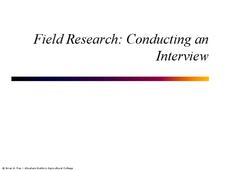PricewaterhouseCoopers
Credit and Debt: Decisions, Decisions...
Borrowing money seems like a great idea until you are in over your head. High schoolers learn the benefits and risks associated with credit and how to be a responsible borrower. More than just credit cards, they...
Curated OER
Trust Circles
Students explore trustworthiness. In this character development lesson plan, students brainstorm synonyms for trustworthiness. Students consider two communities to which they belong, and compare and contrast these communities by...
Curated OER
Naming Trust
Middle schoolers write a poem. For this character lesson, students read a quote about trust and friendship and discuss what they mean. Middle schoolers write an acrostic poem using the letters in their name and come up with a phrase or...
Curated OER
Earning Trust
Students explore trustworthiness. For this character development lesson, students brainstorm communities to which they belong and generate common traits of these communities. Students discuss how trust is gained and write a reflection...
Civil War Trust
Civil War Personalities Lesson Plan
Caring, trustworthiness, and responsibility—these are only a few character traits in focus of a lesson based on stories from the Civil War era. Class members explore several influential lives while reading biographies that highlight...
Curated OER
Discussion Guide for The Catcher in the Rye
Is Holden Caulfield a trustworthy narrator? Groups work together to find evidence in The Catcher in the Rye to support a yes or no stance.
Scholastic
Consider the Source
Who is more trustworthy when it comes to marijuana: a high school student, or The National Institute on Drug Abuse? Sources matter when reading informational text. Help teenagers discern which facts are true with an activity that focuses...
Charlotte Mecklenburg Schools
Honesty
Get your youngsters talking about what it means to be honest, and how difficult it can be to try to cover up the truth, with one of the several collaborative activities listed in this resource.
Facebook
Cybersecurity, Phishing, and Spam
Take a serious look at an equally serious topic! Security scholars explore and discuss the methods hackers use to gain access to personal information during a well-written digital citizenship activity. Part of an extensive series, the...
Curated OER
Fallacies of Weak Induction
A high-level introduction to fallacies of weak induction, including appeals to unqualified authority and ignorance, hasty generalizations, and weak analogies. Each fallacy is defined and shown with an example. For use mostly in college...
Curated OER
Hector's World
Students examine the concept of trust as it relates to trustworthy people. In this safety lesson, students discuss how there are people in our lives that we can rely on for help and support. Students review the story Hector's World and...
Curated OER
Hector's World - Lesson Plan Episode 3 - "It's a Serious Game"
Students analyze how to tell if an adult is trustworthy. In this trustworthiness lesson, students watch an episode of "Hector's World" and discuss how to tell if an adult is trustworthy or not. They draw a picture of a person who they...
Curated OER
"Hector's World": Welcome to the Carnival
Students view a cartoon that introduces the concept of trust. In this trustworthiness lesson, students evaluate behaviors and traits of the characters in "Welcome to the Carnival" and identify who can be trusted. Students complete a...
Curated OER
Trustworthy Reputation
Seventh graders explore the character trait of reputation. For this character education lesson, 7th graders focus on their personal reputation as they discuss positive character traits and reflect on character quotations in journal entries.
Curated OER
Trustworthy Reputation
Seventh graders explore psychology by writing reflections about quotations. For this human behavior lesson, 7th graders read a list of famous quotes about trust by men such as Benjamin Franklin and William Shakespeare. Students complete...
Curated OER
The Lion, the Witch and the Wardrobe
Middle schoolers read chapters 1-5 of The Lion, The Witch, and the Wardrobe. They are asked to describe each of the four siblings-their personalities, actions, and relationships with one another. Students discuss the definition of...
Curated OER
Banking on Family
Learners examine the meaning of a trust bank account. In this financial awareness lesson, students brainstorm ways they are trustworthy to their family and define the meaning of a trust bank account.
Curated OER
And Others?
Having integrity is often easier said than done. After completing the first lesson in a unit on being true to themselves and their values, learners engage in a discussion about three different people in difficult situations that call for...
Curated OER
Field Research: Conducting an Interview
Go through the proper steps to setting up and conducting an interview as part of research. Slides detail preparation, materials you should have, and follow-up procedures. Specific questions for the interview are not suggested but the...
Teach With Movies
Title: "The Time Machine" - Topics: Science-Technology
Director George Pal’s film The Time Machine, based on H. G. Wells’ 1895 science fiction novella and starring Rod Taylor, Alan Young, and Yvette Mimieux, is the focus of a lesson that considers the consequences of time travel. Viewers...
Teach With Movies
The Glenn Miller Story (Film) - Teacher's Guide
Anthony Mann's 1953 film biography, The Glenn Miller Story, is the focus of a series of activities that introduce class members to Miller's life and music. Of particular interest to music students will be the cameos by many famous...
Curated OER
Applauding Good Citizenship in Our Community
First graders identify examples of good citizenship. In this citizenship lesson, 1st graders create an "Applauding Good Citizenship" crown that includes their hand prints with descriptions such as trustworthiness, friendship, and...
Curated OER
Tools of Persuasion
Ethos, pathos, and logos. After reading a passage about Aristotle's, three basic tools of persuasion, individuals answer a series of multiple choice comprehension questions and craft responses to three short-answer essay prompts.
Stanford University
Hurricane Katrina
The adage says that journalism is the first draft of history. How should people evaluate these sources of information? Taking into account various sources, including those from various perspectives and different creators, learners...

























